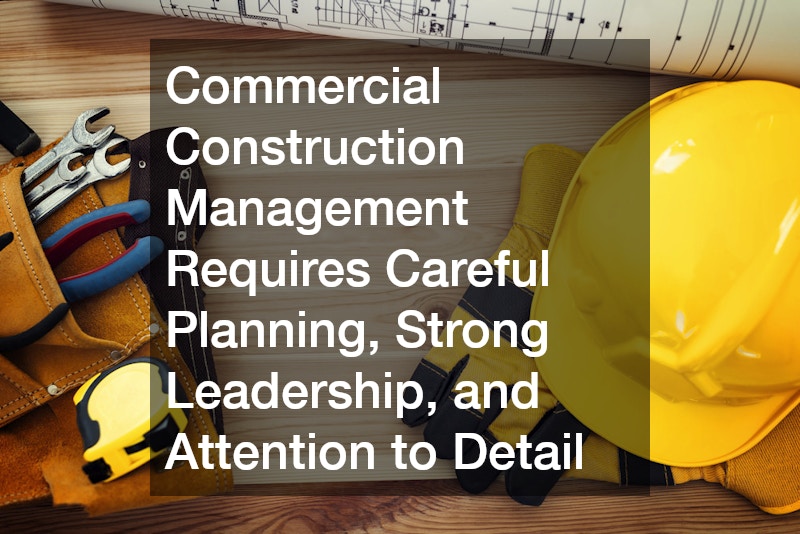
Managing a commercial construction project is no small task. From budgeting and scheduling to safety regulations and quality control, countless moving parts must come together seamlessly to complete the job on time and within budget. Effective commercial construction management ensures every phase of the project runs smoothly, reduces costly delays, and delivers a finished building that meets both functional and aesthetic requirements. For project managers, contractors, and property owners, understanding key strategies can make all the difference between a successful build and a stressful experience.
Develop a Detailed Project Plan
The foundation of any successful construction project is a well-structured plan. Before breaking ground, project managers should outline all essential details, including the project scope, timeline, budget, labor requirements, and materials needed.
A clear plan helps everyone involved understand their roles and responsibilities while minimizing confusion once work begins.
A good project plan should also include contingency measures. Construction projects often face unexpected challenges like bad weather, material shortages, or last-minute design changes. By anticipating potential issues in advance, project managers can adjust timelines and resources without derailing the entire project.
Set a Realistic Budget and Monitor Costs Closely
Budget overruns are one of the most common issues in commercial construction. To prevent this, managers should develop a detailed budget that accounts for materials, labor, equipment, permits, and other expenses. It’s also wise to allocate a portion of the budget for unexpected costs because unforeseen issues almost always arise during construction.
Once the project is underway, tracking expenses regularly ensures that costs stay under control. Using construction management software can help managers monitor financial data in real time, identify potential overruns early, and make adjustments before problems escalate.
Prioritize Clear Communication
A commercial construction project often involves multiple stakeholders, including property owners, architects, engineers, contractors, and city inspectors. Clear communication among all parties is essential to prevent misunderstandings and keep the project moving forward.
Regular meetings and progress updates help ensure everyone remains on the same page regarding timelines, responsibilities, and any changes to the project scope. Many project managers use collaboration tools or apps to share real-time updates, documents, and schedules with all team members.
Hire Experienced Professionals
The success of a commercial construction project depends heavily on the expertise of the people involved. From general contractors to electricians and HVAC specialists, hiring skilled professionals ensures that work is completed safely, efficiently, and up to code.
Before bringing any team member on board, project managers should verify licenses, certifications, and experience with similar projects. Checking references and reviewing portfolios can also help confirm the quality of their work. Experienced professionals are better equipped to handle challenges, provide creative solutions, and maintain high standards throughout the project.
Stay Compliant with Safety and Legal Requirements
Construction sites present numerous safety risks, from heavy machinery to elevated work areas. Strict adherence to safety regulations protects workers, minimizes accidents, and prevents costly delays due to workplace injuries or legal issues.
Project managers should implement clear safety protocols, provide ongoing training, and conduct regular inspections to ensure compliance with Occupational Safety and Health Administration (OSHA) guidelines and local building codes. Maintaining detailed records of safety measures and inspections can also help protect against liability claims.
Use Technology for Better Efficiency
Modern technology offers powerful tools for improving commercial construction management. Building Information Modeling (BIM), for example, allows project teams to create digital representations of the building before construction begins. This technology helps identify potential design conflicts, improve accuracy, and reduce costly errors during the build.
Additionally, project management software can streamline scheduling, budgeting, and communication. Mobile apps allow managers to track progress, approve changes, and access important documents from anywhere, making the entire process more efficient.
Conduct Regular Quality Inspections
Delivering a high-quality finished product requires consistent inspections throughout the project. Rather than waiting until the end to identify problems, project managers should schedule inspections at key milestones to ensure all work meets specifications and industry standards.
Early detection of issues allows for quick corrections, preventing small problems from turning into major delays or costly rework later.
Final Thoughts
Commercial construction management requires careful planning, strong leadership, and attention to detail. By developing a solid project plan, setting a realistic budget, communicating clearly, and leveraging technology, managers can navigate challenges effectively and keep projects on track.
Hiring experienced professionals, prioritizing safety, and conducting regular quality inspections further ensure the final building meets expectations. With the right strategies in place, commercial construction projects can be completed efficiently, safely, and successfully.





